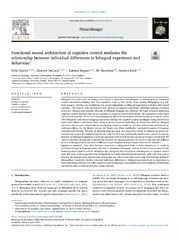| dc.contributor.author | Carter, Felix | |
| dc.contributor.author | DeLuca, Vincent | |
| dc.contributor.author | Segaert, Katrien | |
| dc.contributor.author | Mazaheri, Ali | |
| dc.contributor.author | Krott, Andrea | |
| dc.date.accessioned | 2023-04-13T08:55:55Z | |
| dc.date.available | 2023-04-13T08:55:55Z | |
| dc.date.issued | 2023-04-03 | |
| dc.description.abstract | Bilinguals have often, but not always, been found to outperform monolinguals on domain-general attentional control. Inconsistent findings have been argued to stem, at least partly, from treating bilingualism as a uniform category and from not considering how neural adaptations to bilingual experiences modulate behavioural outcomes. The present study investigated how patterns of language experience, including language switching behaviour, duration and intensity/diversity of bilingual language use, influence the brain processes underlying cognitive control, and how these in turn translate to cognitive control performance. We examined reaction times and spectral dynamics of the electroencephalograms (EEG) of two-hundred-and-thirty-nine participants (about 70% bilinguals) with diverse language experiences during two cognitive control paradigms testing interference suppression (flanker and Simon task). Using structural equation modelling, we found that different bilingual experience factors were related with neurocognitive measures, which in turn were related with behavioural interference effects, for the flanker but not the Simon task. More specifically, increased frequency of language switching and intensity / diversity of bilingual language usage was negatively related to induced top-down control measures (especially midline-frontal theta), which in turn was beneficial for interference control. In contrast, duration of bilingual engagement correlated negatively with evoked bottom-up control measures (especially P3) and was therefore detrimental to interference control. We demonstrate here for the first time how the different factors of bilingual experience lead to different neural adaptations which impact behavioural outcomes. | en_US |
| dc.identifier.citation | Carter, DeLuca, Segaert, Mazaheri, Krott. Functional neural architecture of cognitive control mediates the relationship between individual differences in bilingual experience and behaviour. NeuroImage. 2023 | en_US |
| dc.identifier.cristinID | FRIDAID 2139693 | |
| dc.identifier.doi | 10.1016/j.neuroimage.2023.120085 | |
| dc.identifier.issn | 1053-8119 | |
| dc.identifier.issn | 1095-9572 | |
| dc.identifier.uri | https://hdl.handle.net/10037/28967 | |
| dc.language.iso | eng | en_US |
| dc.publisher | Elsevier | en_US |
| dc.relation.journal | NeuroImage | |
| dc.rights.accessRights | openAccess | en_US |
| dc.rights.holder | Copyright 2023 The Author(s) | en_US |
| dc.rights.uri | https://creativecommons.org/licenses/by/4.0 | en_US |
| dc.rights | Attribution 4.0 International (CC BY 4.0) | en_US |
| dc.title | Functional neural architecture of cognitive control mediates the relationship between individual differences in bilingual experience and behaviour | en_US |
| dc.type.version | publishedVersion | en_US |
| dc.type | Journal article | en_US |
| dc.type | Tidsskriftartikkel | en_US |
| dc.type | Peer reviewed | en_US |


 English
English norsk
norsk
